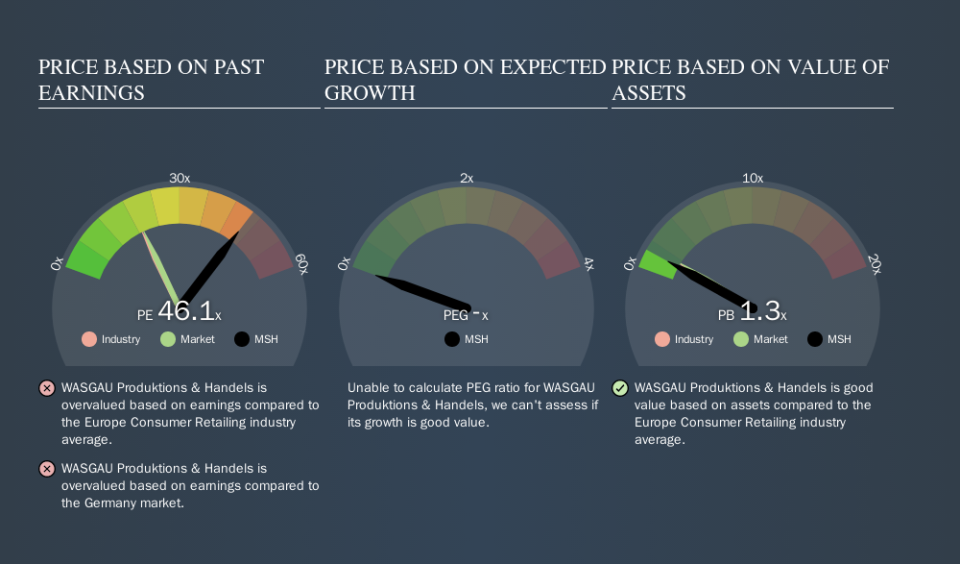Despite Its High P/E Ratio, Is WASGAU Produktions & Handels AG (FRA:MSH) Still Undervalued?

Today, we'll introduce the concept of the P/E ratio for those who are learning about investing. We'll show how you can use WASGAU Produktions & Handels AG's (FRA:MSH) P/E ratio to inform your assessment of the investment opportunity. What is WASGAU Produktions & Handels's P/E ratio? Well, based on the last twelve months it is 46.07. That is equivalent to an earnings yield of about 2.2%.
View our latest analysis for WASGAU Produktions & Handels
How Do I Calculate A Price To Earnings Ratio?
The formula for P/E is:
Price to Earnings Ratio = Share Price ÷ Earnings per Share (EPS)
Or for WASGAU Produktions & Handels:
P/E of 46.07 = €16.50 ÷ €0.36 (Based on the trailing twelve months to June 2019.)
Is A High Price-to-Earnings Ratio Good?
A higher P/E ratio means that buyers have to pay a higher price for each €1 the company has earned over the last year. That isn't a good or a bad thing on its own, but a high P/E means that buyers have a higher opinion of the business's prospects, relative to stocks with a lower P/E.
How Does WASGAU Produktions & Handels's P/E Ratio Compare To Its Peers?
The P/E ratio indicates whether the market has higher or lower expectations of a company. You can see in the image below that the average P/E (18.8) for companies in the consumer retailing industry is lower than WASGAU Produktions & Handels's P/E.
That means that the market expects WASGAU Produktions & Handels will outperform other companies in its industry. Clearly the market expects growth, but it isn't guaranteed. So investors should delve deeper. I like to check if company insiders have been buying or selling.
How Growth Rates Impact P/E Ratios
When earnings fall, the 'E' decreases, over time. Therefore, even if you pay a low multiple of earnings now, that multiple will become higher in the future. So while a stock may look cheap based on past earnings, it could be expensive based on future earnings.
WASGAU Produktions & Handels shrunk earnings per share by 43% over the last year. And EPS is down 25% a year, over the last 3 years. This growth rate might warrant a low P/E ratio.
A Limitation: P/E Ratios Ignore Debt and Cash In The Bank
It's important to note that the P/E ratio considers the market capitalization, not the enterprise value. In other words, it does not consider any debt or cash that the company may have on the balance sheet. Hypothetically, a company could reduce its future P/E ratio by spending its cash (or taking on debt) to achieve higher earnings.
Such expenditure might be good or bad, in the long term, but the point here is that the balance sheet is not reflected by this ratio.
How Does WASGAU Produktions & Handels's Debt Impact Its P/E Ratio?
WASGAU Produktions & Handels's net debt is considerable, at 148% of its market cap. This level of debt justifies a relatively low P/E, so remain cognizant of the debt, if you're comparing it to other stocks.
The Verdict On WASGAU Produktions & Handels's P/E Ratio
WASGAU Produktions & Handels's P/E is 46.1 which is above average (19.4) in its market. With meaningful debt and a lack of recent earnings growth, the market has high expectations that the business will earn more in the future.
Investors should be looking to buy stocks that the market is wrong about. People often underestimate remarkable growth -- so investors can make money when fast growth is not fully appreciated. We don't have analyst forecasts, but you might want to assess this data-rich visualization of earnings, revenue and cash flow.
Of course you might be able to find a better stock than WASGAU Produktions & Handels. So you may wish to see this free collection of other companies that have grown earnings strongly.
We aim to bring you long-term focused research analysis driven by fundamental data. Note that our analysis may not factor in the latest price-sensitive company announcements or qualitative material.
If you spot an error that warrants correction, please contact the editor at editorial-team@simplywallst.com. This article by Simply Wall St is general in nature. It does not constitute a recommendation to buy or sell any stock, and does not take account of your objectives, or your financial situation. Simply Wall St has no position in the stocks mentioned. Thank you for reading.

